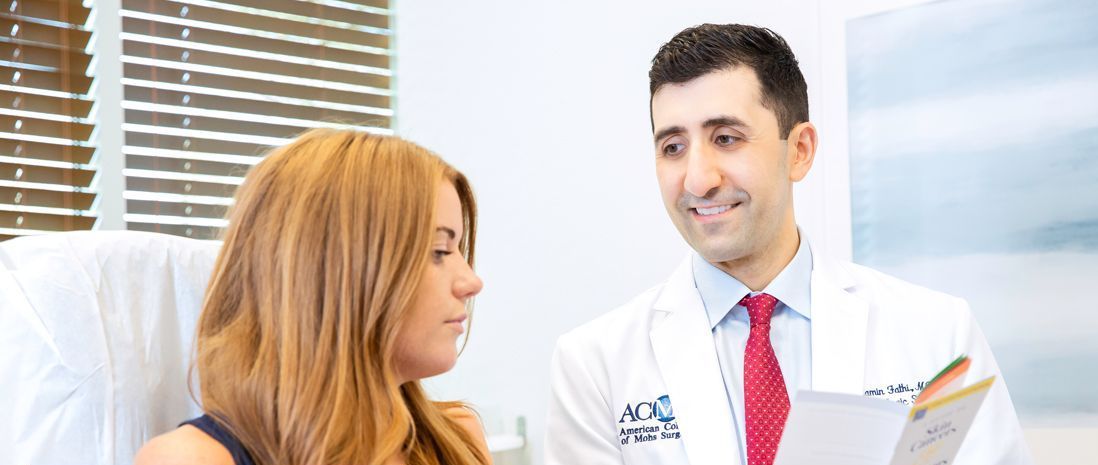Clear Skin Starts Here
Acne is the most common skin condition in the United States, affecting over 50 million Americans annually. At Phoenix Surgical Dermatology Group, our board-certified dermatology providers offer expert, compassionate care to patients struggling with acne — whether you're a teenager facing breakouts or an adult dealing with hormonal flare-ups.
We understand that acne is more than just a cosmetic issue. It can significantly affect your self-esteem, emotional well-being, and overall quality of life. That’s why we develop customized treatment plans that target the root causes of acne to help you achieve clearer, healthier skin and prevent scarring.
Understanding Acne: Causes, Symptoms, and Triggers
Acne is a common and complex skin condition that develops when oil glands and hair follicles become clogged with excess sebum (oil), dead skin cells, and bacteria. This process creates an ideal environment for inflammation and breakouts—typically on the face, chest, back, and shoulders.
Common Types of Acne Lesions:
- Comedones: Whiteheads (closed) and blackheads (open)
- Papules: Small red, inflamed bumps
- Pustules: Pimples containing pus
- Nodules and Cysts: Deeper, painful lesions that can lead to scarring
Common Acne Triggers Include:
- Hormonal changes (e.g., puberty, menstrual cycles, menopause)
- Excess sebum production
- Bacterial overgrowth (Cutibacterium acnes)
- Stress and sleep disturbances
- High humidity or excessive sweating
- Certain medications
- Genetic predisposition
- Inflammatory immune responses
Understanding these causes is key to choosing the most effective treatment plan tailored to your skin's unique needs.
How We Diagnose Acne
Your journey starts with a comprehensive skin consultation. Our dermatology providers will:
- Evaluate your skin to rule out other conditions (like rosacea)
- Discuss potential contributing factors (e.g., hormones, skincare products)
- Grade your acne on a scale of I to IV:
- Grade I: Mild comedonal acne
- Grade II: Papular acne
- Grade III: Pustular or nodulocystic acne
- Grade IV: Severe cystic acne
This assessment helps guide an individualized treatment plan.
Effective Acne Treatment Options
There is no one-size-fits-all solution for acne. Our team utilizes
evidence-based and combination therapies for optimal results:
Topical Treatments
- Retinoids (e.g., tretinoin, adapalene): Prevent clogged pores and promote skin turnover
- Benzoyl peroxide: Reduces bacteria and inflammation
- Topical antibiotics: Minimize bacterial presence and inflammation
Oral Medications:
- Antibiotics (e.g., doxycycline, minocycline): Reduce infection and inflammation
- Hormonal therapy: Birth control pills or spironolactone for adult female hormonal acne
- Isotretinoin (Accutane®): Reserved for severe, scarring, or treatment-resistant acne
In-Office Dermatology Procedures
- Chemical peels: Open pores and treat blackheads and mild acne scars
- Steroid injections: Reduce inflammation in painful cystic acne
- Laser and light-based therapies: Kill acne-causing bacteria and improve skin texture
Why Choose Phoenix Surgical Dermatology Group?
Board-certified dermatologists with experience in treating all skin types
Comprehensive care for teens, adults, and complex acne cases
Patient-centered approach focused on long-term results and education
Onsite procedures available for advanced treatment
Skincare Guidance and Prevention
Your provider will also help create a personalized skincare regimen to support ongoing improvement and prevent future breakouts. This may include:
- Non-comedogenic cleansers and moisturizers
- Sunscreen suitable for acne-prone skin
- Guidance on cosmetics and shaving products
Frequently Asked Questions About Acne and Treatment
What is the difference between whiteheads and blackheads?
Both are types of clogged pores (comedones). Whiteheads are closed comedones, while blackheads are open comedones exposed to air, which causes oxidation and darkening.
Can adults get acne?
Yes. Over 20% of adult women experience acne into their 30s and 40s, often related to hormonal changes or stress.
How long does it take for acne treatments to work?
Most patients see noticeable improvements within 6–8 weeks. Some treatments, such as isotretinoin, may take several months for full results.
Is acne caused by poor hygiene?
No. Acne is primarily caused by internal factors like hormones and inflammation. Over-washing or harsh scrubbing can actually worsen acne.
Will I get scars from acne?
Without proper treatment, moderate and severe acne — especially cystic acne — can lead to permanent scarring. Early intervention is key to prevention.
Clear Your Skin with Professional Acne Treatment
If you're ready to take control of your acne, trust the experienced team at Phoenix Surgical Dermatology Group. We’re committed to helping patients achieve clearer skin and renewed confidence through personalized, science-backed acne treatments in Phoenix, AZ.
Call today or request an appointment online to start your journey to healthy, acne-free skin.





